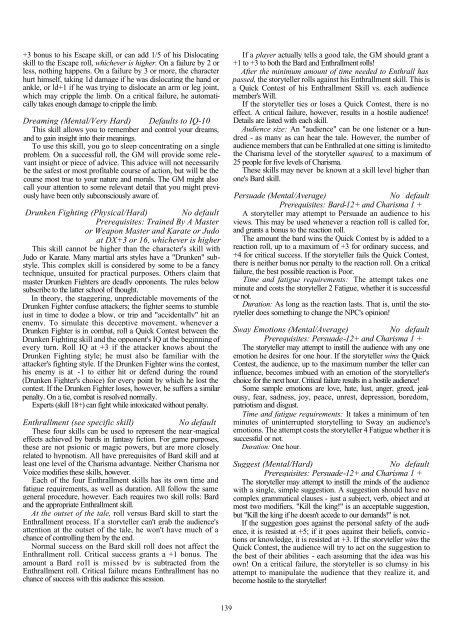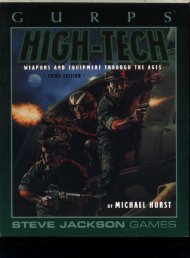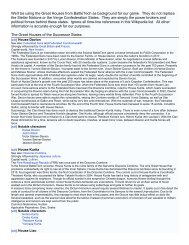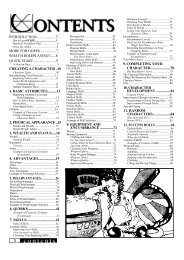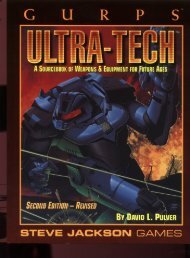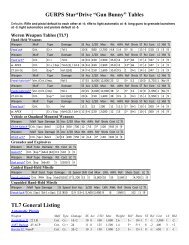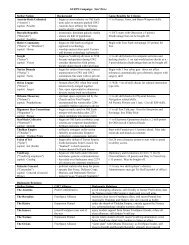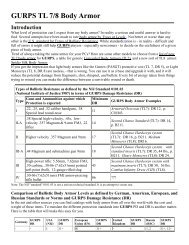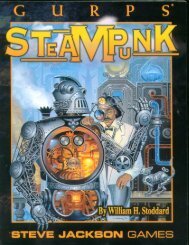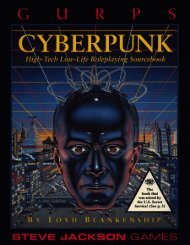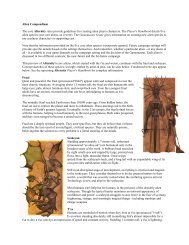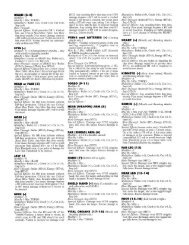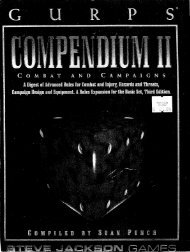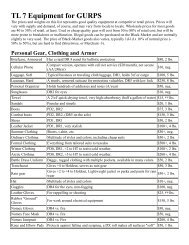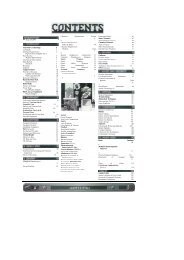GURPS - Compendium 1..
GURPS - Compendium 1..
GURPS - Compendium 1..
You also want an ePaper? Increase the reach of your titles
YUMPU automatically turns print PDFs into web optimized ePapers that Google loves.
+3 bonus to his Escape skill, or can add 1/5 of his Dislocating<br />
skill to the Escape roll, whichever is higher. On a failure by 2 or<br />
less, nothing happens. On a failure by 3 or more, the character<br />
hurt himself, taking 1d damage if he was dislocating the hand or<br />
ankle, or ld+1 if he was trying to dislocate an arm or leg joint,<br />
which may cripple the limb. On a critical failure, he automatically<br />
takes enough damage to cripple the limb.<br />
Dreaming (Mental/Very Hard) Defaults to IQ-10<br />
This skill allows you to remember and control your dreams,<br />
and to gain insight into their meanings.<br />
To use this skill, you go to sleep concentrating on a single<br />
problem. On a successful roll, the GM will provide some relevant<br />
insight or piece of advice. This advice will not necessarily<br />
be the safest or most profitable course of action, but will be the<br />
course most true to your nature and morals. The GM might also<br />
call your attention to some relevant detail that you might previously<br />
have been only subconsciously aware of.<br />
Drunken Fighting (Physical/Hard) No default<br />
Prerequisites: Trained By A Master<br />
or Weapon Master and Karate or Judo<br />
at DX+3 or 16, whichever is higher<br />
This skill cannot be higher than the character's skill with<br />
Judo or Karate. Many martial arts styles have a "Drunken" substyle.<br />
This complex skill is considered by some to be a fancy<br />
technique, unsuited for practical purposes. Others claim that<br />
master Drunken Fighters are deadly opponents. The rules below<br />
subscribe to the latter school of thought.<br />
In theory, the staggering, unpredictable movements of the<br />
Drunken Fighter confuse attackers; the fighter seems to stumble<br />
just in time to dodge a blow, or trip and "accidentally" hit an<br />
enemy. To simulate this deceptive movement, whenever a<br />
Drunken Fighter is in combat, roll a Quick Contest between the<br />
Drunken Fighting skill and the opponent's IQ at the beginning of<br />
every turn. Roll IQ at +3 if the attacker knows about the<br />
Drunken Fighting style; he must also be familiar with the<br />
attacker's fighting style. If the Drunken Fighter wins the contest,<br />
his enemy is at -1 to either hit or defend during the round<br />
(Drunken Fighter's choice) for every point by which he lost the<br />
contest. If the Drunken Fighter loses, however, he suffers a similar<br />
penalty. On a tie, combat is resolved normally.<br />
Experts (skill 18+) can fight while intoxicated without penalty.<br />
Enthrallment (see specific skill)<br />
No default<br />
These four skills can be used to represent the near -magical<br />
effects achieved by bards in fantasy fiction. For game purposes,<br />
these are not psionic or magic powers, but are more closely<br />
related to hypnotism. All have prerequisites of Bard skill and at<br />
least one level of the Charisma advantage. Neither Charisma nor<br />
Voice modifies these skills, however.<br />
Each of the four Enthrallment skills has its own time and<br />
fatigue requirements, as well as duration. All follow the same<br />
general procedure, however. Each requires two skill rolls: Bard<br />
and the appropriate Enthrallment skill.<br />
At the outset of the tale, roll versus Bard skill to start the<br />
Enthrallment process. If a storyteller can't grab the audience's<br />
attention at the outset of the tale, he won't have much of a<br />
chance of controlling them by the end.<br />
Normal success on the Bard skill roll does not affect the<br />
Enthrallment roll. Critical success grants a +1 bonus. The<br />
amount a Bard roll is missed by is subtracted from the<br />
Enthrallment roll. Critical failure means Enthrallment has no<br />
chance of success with this audience this session.<br />
If a player actually tells a good tale, the GM should grant a<br />
+1 to +3 to both the Bard and Enthrallment rolls!<br />
After the minimum amount of time needed to Enthrall has<br />
passed, the storyteller rolls against his Enthrallment skill. This is<br />
a Quick Contest of his Enthrallment Skill vs. each audience<br />
member's Will.<br />
If the storyteller ties or loses a Quick Contest, there is no<br />
effect. A critical failure, however, results in a hostile audience!<br />
Details are listed with each skill.<br />
Audience size: An "audience" can be one listener or a hundred<br />
- as many as can hear the tale. However, the number of<br />
audience members that can be Enthralled at one sitting is limited to<br />
the Charisma level of the storyteller squared, to a maximum of<br />
25 people for five levels of Charisma.<br />
These skills may never be known at a skill level higher than<br />
one's Bard skill.<br />
Persuade (Mental/Average)<br />
No default<br />
Prerequisites: Bard-12+ and Charisma 1 +<br />
A storyteller may attempt to Persuade an audience to his<br />
views. This may be used whenever a reaction roll is called for,<br />
and grants a bonus to the reaction roll.<br />
The amount the bard wins the Quick Contest by is added to a<br />
reaction roll, up to a maximum of +3 for ordinary success, and<br />
+4 for critical success. If the storyteller fails the Quick Contest,<br />
there is neither bonus nor penalty to the reaction roll. On a critical<br />
failure, the best possible reaction is Poor.<br />
Time and fatigue requirements: The attempt takes one<br />
minute and costs the storyteller 2 Fatigue, whether it is successful<br />
or not.<br />
Duration: As long as the reaction lasts. That is, until the storyteller<br />
does something to change the NPC's opinion!<br />
Sway Emotions (Mental/Average) No default<br />
Prerequisites: Persuade-12+ and Charisma 1 +<br />
The storyteller may attempt to instill the audience with any one<br />
emotion he desires for one hour. If the storyteller wins the Quick<br />
Contest, the audience, up to the maximum number the teller can<br />
influence, becomes imbued with an emotion of the storyteller's<br />
choice for the next hour. Critical failure results in a hostile audience!<br />
Some sample emotions are love, hate, lust, anger, greed, jealousy,<br />
fear, sadness, joy, peace, unrest, depression, boredom,<br />
patriotism and disgust.<br />
Time and fatigue requirements: It takes a minimum of ten<br />
minutes of uninterrupted storytelling to Sway an audience's<br />
emotions. The attempt costs the storyteller 4 Fatigue whether it is<br />
successful or not.<br />
Duration: One hour.<br />
Suggest (Mental/Hard)<br />
No default<br />
Prerequisites: Persuade-12+ and Charisma 1 +<br />
The storyteller may attempt to instill the minds of the audience<br />
with a single, simple suggestion. A suggestion should have no<br />
complex grammatical clauses - just a subject, verb, object and at<br />
most two modifiers. "Kill the king!" is an acceptable suggestion,<br />
but "Kill the king if he doesn't accede to our demands!" is not.<br />
If the suggestion goes against the personal safety of the audience,<br />
it is resisted at +5; if it goes against their beliefs, convic -<br />
tions or knowledge, it is resisted at +3. If the storyteller wins the<br />
Quick Contest, the audience will try to act on the suggestion to<br />
the best of their abilities - each assuming that the idea was his<br />
own! On a critical failure, the storyteller is so clumsy in his<br />
attempt to manipulate the audience that they realize it, and<br />
become hostile to the storyteller!<br />
139


